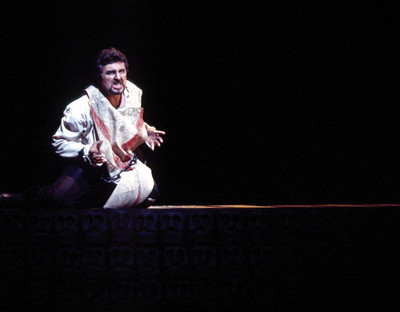
The news of tenor Jerry Hadley’s death on July 18 has saddened opera aficionados worldwide and caused a particular ache in this arts writer.
A friend from Chicago Lyric Opera invited me to join her in 1982 at Opera Theatre of St. Louis. “They’re doing ‘Cosi'” she said, “with Jerry Hadley, a hot young tenor everybody’s talking about. Calvin Simmons is conducting.”
The weekend was memorable for the sight of Simmons’ lanky frame draped over a sofa in the hotel lobby and also for the quality of young singers that included Hadley as Ferrando, Thomas Hampson as Guglielmo, Ashley Putnam as Fiordiligi, Patricia McCaffery as Dorabella and Ruth Golden as Despina. Staged by Jonathan Miller, all went on to successful careers, especially Hampson and Hadley, who became good friends. Hadley memorably recorded the complete “Show Boat” with Frederica Von Stade (1988) and “Candide” (1991 Grammy Award for best classical album) conducted by the composer, Leonard Bernstein.
I interviewed Hadley for Opera News in 1996 when he was performing in “Tales of Hoffmann” at San Francisco Opera. At the same time, he was preparing the title role in the San Diego Opera’s (SDO) world premiere of Myron Fink’s “The Conquistador” (1997). Hadley welcomed “the lady from San Diego” with chocolate chip cookies and fresh-brewed coffee, and we settled down for what became a three-hour talk.
He spoke of “The Conquistador,” his avid interest in history, his life at mid-career and his love of family. Just before we parted, I asked what he would have his two young sons (Nathan and Ryan, now in their teens) know about him. He choked up during this impassioned response.
“I would hope that my kids know always that I love them; that there are things in life that are important, like integrity, like standing up for what you believe but always knowing that there are people that believe in other things. I hope we raise them in a way that they have full access to their whole persons.
“But you asked what I wanted them to know about me, and I deflected that, didn’t I? I want them to know that I did my damnedest; that I always tried to do as an artist and a person what is right and truthful. I want them to know that I’m perfectly capable of falling flat on my face and failing “¦ that when I do my job right, when I do my job well, I read like an open book. The older I get the scarier that becomes because I’m not willing to be superficial any more. In not wanting to be superficial, you lay yourself open to a lot of potential hurt.”
Finally, the hurt grew too large ” the hurt of a broken marriage, a foundering career and financial problems. Hadley was under treatment for depression at the time of his death, the result of a self-inflicted gunshot July 10. He was 55 years old.
SDO audiences remember him for “The Tales of Hoffmann” (1994), the Tom and Jerry Show (1995) and “The Conquistador.” During the opening night of SDO’s 2005 “Die Fledermaus,” he was a guest performer in the gala scene. His final Metropolitan Opera appearances were as Tom Rakewell in Miller’s production of “The Rake’s Progress” (1997), and in the title role of the world premiere and revival of John Harbison’s “The Great Gatsby” (1999 and 2002).
Fink remarked, “In addition to his vocal and musical talents, Jerry had an intellectual curiosity that made him a wonderful companion. What came through above all was a joy in what he did and that affected everyone who spent time with him.”
SDO general director Ian Campbell said, “Jerry was one of the most important singers of his generation, and his recorded legacy will allow him to live on. I considered him a friend, as well as a singer, and a man of great charm and grace. I shall miss him.”
And finally, these remarks from Hadley’s colleague, tenor Richard Leech: “Jerry’s singing would make you cry, and his jokes would make you laugh uncontrollably. His generous personality would embrace the world around him and always make it a better place. As we developed together through NY City Opera and on to the Met, he not only represented the kind of career to which I aspired, but, perhaps more importantly, taught me more about being a colleague than anyone else I have encountered.
"He was always there for his fellow singers, 100 percent, and in an era of competition and vain rivalry, chose the other road, making those of us in his ‘club’ of tenors feel like brothers. Our family will not be the same, ever again.”












Discussion about this post